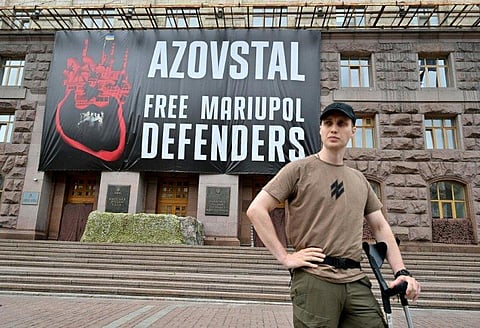

In contrast to festive summer crowds around him in central Kyiv, Vladyslav Zhaivoronok has a grim story to tell about the defence of Mariupol, the injuries he suffered and his weeks in captivity.
The 29-year-old Azov Regiment soldier, who leans on his crutches as he lost his left leg in combat, spoke to AFP in front of a huge banner reading "Free Mariupol Defenders" on a city hall building.
"It was getting worse and worse, harder and harder. We held the defence as long as it could be held," he said of the fighting at the Azovstal steelworks -- some of the fiercest in the last six months.
Russian forces invaded Ukraine on February 24 and within days had surrounded Mariupol, a strategic industrial port hub on the Sea of Azov.
Zhaivoronok said he and his comrades took up positions in the city's sprawling Azovstal facility in March in a desperate attempt to fight on.
Under constant shelling, he made his base in a half-ruined bunker, going out during the day to carry out his duties as a drone operator.
He said that "the entire area was littered with fragments of buildings" and there was a desperate lack of water, food and weapons.
"It was consistently bad everywhere," said Zhaivoronok.
As he spoke, passers-by looked back at the soldier, who wore military-style brown shorts with an empty left trouser leg.
- Stretchered out of Azovstal -
Despite the rapidly deteriorating situation at Azovstal, Zhaivoronok said the soldiers managed to keep up morale.
"The last days I was anticipating a kind of the last battle. We were waiting for this and were ready for this," he said.
Then, on May 15, he was hit by an anti-tank missile.
Rushed to the "medical bunker", he found himself on an improvised operating table on the verge of death.
His right eye was also badly wounded in the blast.
On the morning of the following day, he had his leg amputated.
He regained consciousness afterwards for just a few seconds before being taken out of Azovstal.
He remembers being stretchered out and seeing the Russian soldiers' patches bearing the "Z" symbol used by the invaders.
Due to his heavy injury, he was spared the fate of his comrades who were sent to the notorious Olenivka prison in the occupied Donetsk region, where a blast last month reportedly killed dozens of Ukrainian prisoners.
But the weeks that Zhaivoronok spent in captivity in one of the Donetsk hospitals brought him suffering of a different kind.
"There was no contact with relatives, no access to the phone," he said.
Medical care was "very low-grade" and medicines were in short supply.
"I was just dripping rotten meat because, after being seriously wounded, I did not start receiving antibiotics until the fifth day," he said.
He and three other soldiers from his ward were given just enough food "so that the heart would not stop".
"And we were told every day that no one needed us, that they would not exchange us for anyone, that everyone had abandoned us."
- 'What presses from within' -
His month-and-a-half of captivity ended without warning.
"We were awakened at 4:00 am, the lists were read out, we were taken outside, loaded onto buses and driven until evening," Zhaivoronok recalls.
He and over a hundred other wounded Ukrainian prisoners left the hospital for a prisoner exchange.
"I could not breathe out until I was on Ukrainian territory, out of reach of (Russian) artillery."
Zhaivoronok tries to crack jokes, making light of his heavy injuries.
"I've brought a lot of work to our medics," he grins.
As a career serviceman, he said he continues to fulfil certain military obligations despite his injuries.
The soldier speaks very calmly.
His voice slightly breaks only once -- when he talks about the thousands of Ukrainian prisoners remaining in Russian captivity.
"It does not give rest. This is what presses from within. When the guys are back, I'll be able to breathe more freely."